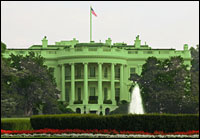
A professor of mine once remarked that while the environmental movement is wide, it is also thin. Nowhere is this more evident than in national elections, where candidates focus almost exclusively on national security issues and bread-and-butter economic agendas. (In contrast, local and state elections often produce clear environmental mandates.)
Despite the perception that Democratic candidates place more of an emphasis on environmental issues, in 2000 Gore talked more about putting the social security surplus in a lockbox than he did about global warming, while in 2004 Kerry barely mentioned the environment or energy policy despite numerous opportunities and the obvious link between our addiction to Middle Eastern oil and terrorism.
So far, the top Democratic presidential candidates for 2008 have not made the environment a major centerpiece of their campaigns. In speeches, they have done little more than make passing references to global warming or energy security. (This brings up another major issue: energy security may very well turn out to be the enemy of the environment if the focus remains mostly on clean coal and biofuels. I am still waiting for a candidate of either party to show a level of sophistication and differentiate between good and bad energy-security initiatives.)
Whether we like it or not, with a simple stroke of the pen, our national politicians can do more to benefit or the harm the environment than the individual actions of even millions of committed environmentalists. And the issues that are most pressing — climate change and biodiversity preservation — require national and international leadership.
I think investing significant resources to pressure the major candidates to lay out clear and prominent environmental objectives would be a good investment of resources by the environmental community. More on this later.


